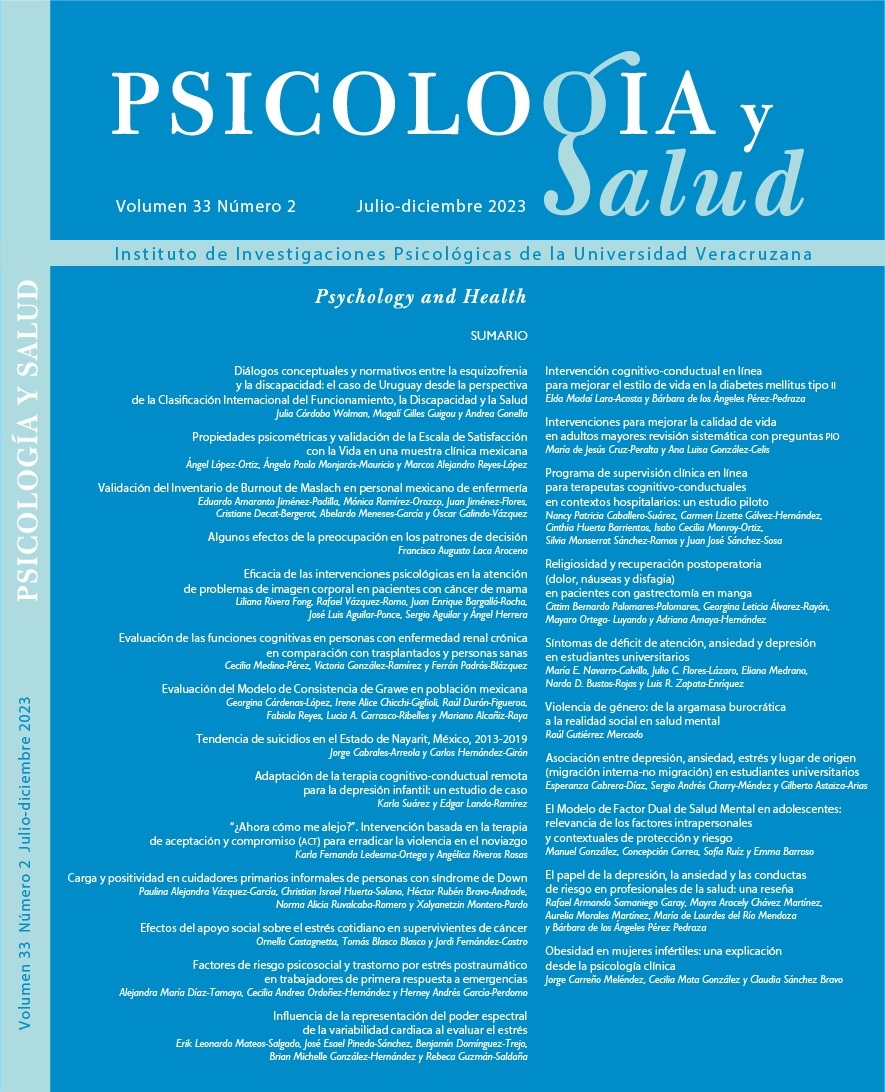Abstract
Introduction. The present study was carried out due to the few previous studies on cognitive functioning in patients with chronic kidney disease (CKD), especially comparing transplant recipients with patients receiving hemodialysis treatment. Objective. To compare cognitive functioning in people with CKD under hemodialysis treatment, post-kidney transplantation, and healthy people. Method. The study applied standardized neuropsychological tests: MoCa Test, King Figure, and Token Test to assess cognitive functions. Results. Better cognitive performance occurred in the screening test and visual memory in the control and the transplanted groups than in the hemodialysis group. Discussion. The findings suggest that people with chronic kidney disease with transplant treatment improve cognitive performance significantly after 6 to 12 months after the intervention.
References
Alvarado, M. (2014). Complicaciones de pacientes en la unidad de hemodiálisis. Tesis inédita de Maestría. Guatemala: Universidad de San Carlos de Guatemala. Recuperado de http://www.repositorio.usac.edu.gt/1512/1/05_9438.pdf.
Bugnicourt, J., Godefroy, O., Chillon, J., Choukroun, G. y Massy, A. (2013). Cognitive disorders and dementia in CKD: The neglected kidney-brain axis. Journal of the American Society of Nephrology, 24, 353-363.
Cortés S., J.F., Galindo, G., Villa, M. y Salvador, C.J. (1996). La figura compleja de Rey: propiedades psicométricas. Salud Mental, 19(3), 42-48. http://revistasaludmental.com.mx/index.php/salud_mental/article/view/598/598.
De Renzi, E. y Vignolo, L.A. (1962). The Token Test: A sensitive test to detect receptive disturbances in aphasics. Brain, 85(4), 665-678. Doi: 10.1093/Brain/85.4.665.
Estrada, V., López, A.M., Alvarado, R. y Cervantes, L. (2009). Insuficiencia renal crónica. México: Unidad de Proyectos Especiales de la Universidad Nacional Autónoma de México. Recuperado de http://www.facmed.unam.mx/sms/temas/2009/02_feb_2k9.pdf.
Gelb, S., Jean S., R., Hill, A. y Loken T., W. (2008). Cognitive outcome following kidney transplatation. Nephrology. Dialysis & Transplantation, 23, 1032-1038.
Gómez A., L.F., Lindao S., M.O., Vásquez C., D.A. y Tettamanti M., D. (2020). Asociación entre enfermedad renal crónica no terminal y deterioro cognitivo en adultos entre 55 a 65 años de edad. Revista Ecuatoriana de Neurología, 29(1), 30-34.
Gorostidi, M., Santamaría, R., Alcázar, R., Fernandez F., G., Galcerán, J., Goicoechea, M. y Ruilope, L. (2014). Documento de la Sociedad Española de Nefrología sobre las guías KDIGO para la evaluación y el tratamiento de la enfermedad renal crónica. Revista de Nefrología, 34, 302-316. Recuperado de http://scielo.isciii.es/pdf/nefrologia/v34n3/especial2.pdf.
Instituto Nacional de Salud Pública (2020). La enfermedad renal crónica en México. Cuernavaca (México): Autor.
Jenkins, K. y Mahon, A. (2008). Enfermedad renal crónica (estadios 4-5). Madrid: Asociación Europea de Enfermeras de Diálisis y Trasplantes/Asociación Europea de Cuidado Renal (EDTNA/ERCA. Recuperado de: https://www.edtnaerca.org/resource/edtna/files/CKD_4-5_Esp_lr.pdf.
Kramer, L., Madi, C., Stockenhueber, F., Yeganehfar, W., Eisenhuber, E., Derfler, K., Lenz, K., Schneider, B. y Grimm, G. (1996). Beneficial effect of renal transplantation on cognitive brain function. Viena: University of Vienna, 49, 833-838.
López, M., Venado, A., Moreno, J. y Rodríguez, M. (2009). Insuficiencia renal crónica. Unidad de Proyectos Especiales. México: UNAM.
Lozano, A., Watt, K.M. y Huerta, J. (2009). A comparison study of 12th grade Hispanic students’ college anticipations, aspirations, and college preparatory measures. American Secondary Education, 38(1), 92-110. Recuperado de: https://www.researchgate.net/publication/282853752.
Méndez D., A., Méndez, J.F., Tapia, T., Muñoz, A. y Aguilar, L. (2010). Epidemiología de la insuficiencia renal crónica en México. Diálisis y Trasplante, 31(1). Doi: 10.1016/S1886-2845(10)70004-7.
Moreira, A., Gulherme, C.S., Jardim de P., J., Teixeira, M.D., Paiva, A., Cazita, V., Coutinho, G., Vinpicius, J.S. y Fernandes, L.M.D. (2011). Estudio normativo de la versión reducida de Token Test: datos preliminares para una población brasileña de edad avanzada. Revista de Psiquiatría Clínica, 38(3), 97-101.
Nasreddine, Z.S., Phillips, N.A., Bédirian, V. et al. (2005), The Montreal Cognitive Assessment, MoCA: A brief screening tool for mild cognitive impairment. Journal of the American Geriatric Society, 53, 695-699.
Pawar, A.A., Rathod, J., Chaudhury, S., Saxena, S.K., Saldanha, D., Ryali, V.S.S.R. y Srivastava, K. (2006). Cognitive and emotional effects of renal transplantation. Indian Journal of Psychiatry, 48, 21-26.
Rey, A. y Osterrrieth, P.A. (1941). Test de Copia de una Figura Compleja (Adapt. de M. V. de la Cruz). México: TEA Ediciones.
Sánchez R., S., Ostrosky S., F., Morales B., L.E., Nogués V., M.G., Alberú G., J. (2010). Trasplante renal: efectos en el perfil cognoscitivo. Revista Chilena de Neuropsicología, 5(2), 82-90.
Tamayo, J.A. y Lastiri, H.S. (2016). La enfermedad renal crónica en México. Hacia una política nacional para enfrentarla. Ciudad de México: Consejo Nacional de Ciencia y Tecnología.
Vita, L., Portillo, F., Álvarez, G., Llarena, S. y Bruno, D. (2020). Perfil cognitivo de cuatro pacientes con enfermedad renal crónica que acceden a trasplante renal. San Luis (Argentina): Universidad Católica de Cuyo.

